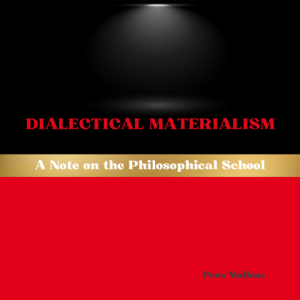

Dialectical Materialism: A Note on the Philosophical School
Pons Malleus
This audiobook is narrated by a digital voice.
This audiobook is an inquiry into one of the most influential and controversial schools of philosophy in modern history: Dialectical Materialism. Rooted in the intellectual traditions of Hegelian dialectics and Marxist materialism, dialectical materialism represents not merely a philosophical method, but a worldview—one that seeks to understand and change the world through the lens of contradiction, motion, and material conditions.
Dialectical materialism emerged in the 19th century, shaped most decisively by Karl Marx and Friedrich Engels, who reconfigured Hegel’s idealist dialectic into a materialist framework. They argued that ideas do not drive history independently of the material world; rather, human consciousness is shaped by the social and economic structures within which it develops. From this standpoint, thought is not abstracted from life but is inseparable from the lived, concrete reality of human labor, production, and social relations.
The dialectical method, as developed by Hegel, emphasized that reality is not static but dynamic, composed of contradictions whose tensions and resolutions drive development. Marx and Engels preserved this kernel but inverted its idealist foundation. In doing so, they established a materialist dialectic: a method of understanding historical and natural phenomena as processes—interconnected, constantly changing, and shaped by internal contradictions.
For dialectical materialism, change is not accidental but necessary; it arises from the conflicts inherent within systems. Whether in the natural world, in society, or in the realm of thought, contradictions are not anomalies but the very engine of transformation.
Duration - 3h 2m.
Author - Pons Malleus.
Narrator - Digital Voice Alistair G.
Published Date - Friday, 24 January 2025.
Copyright - © 2025 Pons Malleus ©.
Location:
United States
Networks:
Pons Malleus
Digital Voice Alistair G
Western Philosophical Schools
English Audiobooks
Findaway Audiobooks
Description:
This audiobook is narrated by a digital voice. This audiobook is an inquiry into one of the most influential and controversial schools of philosophy in modern history: Dialectical Materialism. Rooted in the intellectual traditions of Hegelian dialectics and Marxist materialism, dialectical materialism represents not merely a philosophical method, but a worldview—one that seeks to understand and change the world through the lens of contradiction, motion, and material conditions. Dialectical materialism emerged in the 19th century, shaped most decisively by Karl Marx and Friedrich Engels, who reconfigured Hegel’s idealist dialectic into a materialist framework. They argued that ideas do not drive history independently of the material world; rather, human consciousness is shaped by the social and economic structures within which it develops. From this standpoint, thought is not abstracted from life but is inseparable from the lived, concrete reality of human labor, production, and social relations. The dialectical method, as developed by Hegel, emphasized that reality is not static but dynamic, composed of contradictions whose tensions and resolutions drive development. Marx and Engels preserved this kernel but inverted its idealist foundation. In doing so, they established a materialist dialectic: a method of understanding historical and natural phenomena as processes—interconnected, constantly changing, and shaped by internal contradictions. For dialectical materialism, change is not accidental but necessary; it arises from the conflicts inherent within systems. Whether in the natural world, in society, or in the realm of thought, contradictions are not anomalies but the very engine of transformation. Duration - 3h 2m. Author - Pons Malleus. Narrator - Digital Voice Alistair G. Published Date - Friday, 24 January 2025. Copyright - © 2025 Pons Malleus ©.
Language:
English
DIALECTICAL MATERIALISM
Duración:00:00:10
Introduction to Dialectical Materialism
Duración:00:21:01
Historical Context and Development
Duración:00:24:54
Dialectics - The Core Methodology
Duración:00:20:10
Materialist Conception of History
Duración:00:20:48
Key Thinkers – Karl Marx and FRIEDRICH Engels
Duración:00:21:15
Conceptual Evolution – Vladimir Lenin
Duración:00:23:04
Contrasts with Idealism and Other Philosophies
Duración:00:17:30
Contemporary Interpretations and Critiques
Duración:00:16:04
The Relevance of Dialectical Materialism Today
Duración:00:18:02